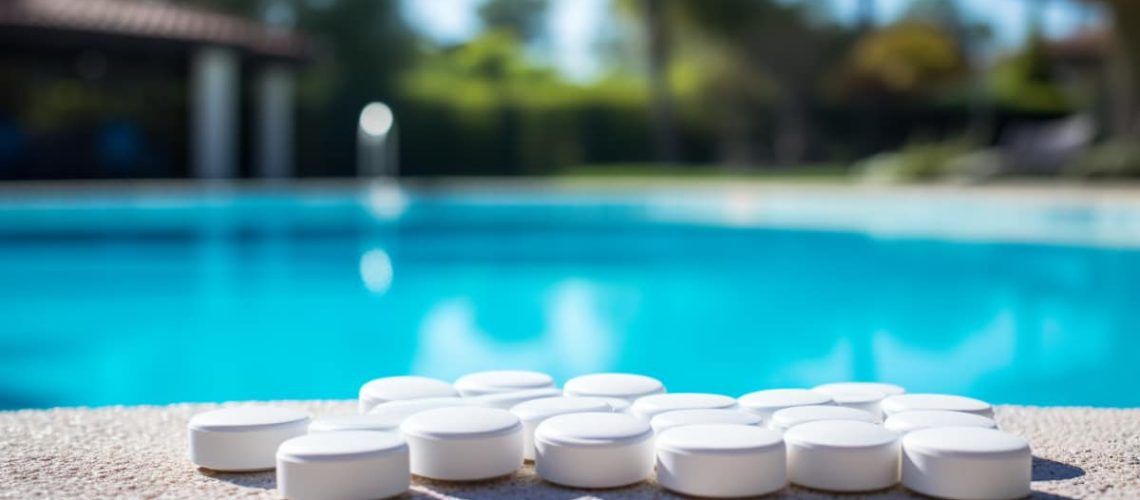Stabilized vs. Unstabilized Chlorine: Making the Right Choice for Your Pool
A sparkling and clean pool is the dream of every pool owner, especially during the hot Texas summers. However, achieving and maintaining that pristine water quality requires careful consideration of the chemicals used, particularly chlorine. Chlorine plays a pivotal role in pool water sanitation, but there are two main types: stabilized and unstabilized chlorine. Choosing the right type is crucial for effective pool maintenance, and BPS, The Backyard Pools Specialists in Texas, is here to guide you through this essential decision.
The Role of Chlorine in Pool Maintenance
Before diving into the specifics of stabilized vs. unstabilized chlorine, it’s essential to understand its role in pool maintenance. Chlorine is a chemical sanitizer that kills bacteria, algae, and other microorganisms that can thrive in pool water. It ensures that your pool remains safe and free from harmful pathogens, making it suitable for swimming.
Chlorine exists in various forms, including liquid, tablets, and granules. However, the two primary categories that concern pool owners are stabilized vs. unstabilized chlorine.
Stabilized Chlorine
Stabilized chlorine, often found in chlorine tablets or granules, contains a chemical stabilizer known as cyanuric acid. Cyanuric acid serves a vital function by protecting chlorine from degradation due to the sun’s ultraviolet (UV) rays. When chlorine is exposed to sunlight, it breaks down rapidly, losing effectiveness. Stabilized chlorine helps prolong chlorine’s life in the pool water, ensuring it continues sanitizing effectively.
Advantages of Stabilized Chlorine
- Long-lasting: Stabilized chlorine remains active for an extended period, reducing the frequency of chemical additions.
- Sun protection: Cyanuric acid shields chlorine from UV degradation, making it ideal for outdoor pools exposed to sunlight.
- Easy to use: Chlorine tablets and granules are convenient to handle and distribute evenly in the pool.
Unstabilized Chlorine
Unstabilized chlorine, often in the form of liquid chlorine or calcium hypochlorite, lacks cyanuric acid. As a result, it doesn’t have the UV protection offered by stabilized chlorine. While it is a powerful sanitizer, it requires more frequent application to maintain pool water quality, especially in sunny regions like Texas.
Advantages of Unstabilized Chlorine
- Quick action: Unstabilized chlorine swiftly sanitizes pool water, making it suitable for shock treatments or addressing pool water problems.
- No cyanuric acid buildup: Continued use of stabilized chlorine can lead to an accumulation of cyanuric acid in the pool, potentially requiring corrective action. Unstabilized chlorine avoids this issue.
Choosing the Right Chlorine for Your Pool with BPS
Selecting the right type of chlorine for your pool is a crucial decision, and BPS, The Backyard Pools Specialists in Texas, can help you make an informed choice customized to your specific needs.
Factors to Consider When Choosing Chlorine:
Pool Type
The type of pool you have, indoor or outdoor, will influence your chlorine choice. Outdoor pools exposed to sunlight may benefit from stabilized chlorine, while indoor pools may use unstabilized chlorine.
Sunlight Exposure
The amount of sunlight your pool receives is a significant factor. Pools in sun-drenched areas like Houston, Conroe, Cypress, Barker Cypress, Katy, Tomball, Spring, Magnolia, The Woodlands, and Montgomery will benefit from stabilized chlorine to combat UV degradation.
Maintenance Preferences
Your preferred level of involvement in pool maintenance plays a role. Stabilized chlorine requires less frequent application, while unstabilized chlorine may demand more attention.
Initial Water Condition
If you’re starting with water that’s already balanced and clear, stabilized chlorine may be more suitable for maintaining water quality. However, unstabilized chlorine can be helpful for shock treatments or when dealing with specific issues.
Cyanuric Acid Levels
Regular testing of cyanuric acid levels is essential when using stabilized chlorine. BPS can assist with routine water testing to ensure the proper balance of chemicals in your pool.
Stabilized vs. Unstabilized Chlorine: Make The Right Choice With The Backyard Pool Specialists
Maintaining a clean and safe pool in Texas, where hot summers and abundant sunlight are the norm, requires careful consideration of the type of chlorine you use. Stabilized chlorine offers UV protection and long-lasting sanitation, making it an excellent choice for outdoor pools. In contrast, unstabilized chlorine acts swiftly and avoids cyanuric acid buildup, making it suitable for indoor pools or quick treatments.
BPS, The Backyard Pools Specialists in Texas, is your trusted partner in making the right choice for your pool’s chlorine needs. Whether you’re in Houston, Conroe, Cypress, Barker Cypress, Katy, Tomball, Spring, Magnolia, The Woodlands, or Montgomery, BPS provides expert guidance and a range of services to ensure your pool stays clean, safe, and inviting all year round. With their knowledge and expertise, you can enjoy your pool without worry, knowing you’ve made the best choice for your water sanitation needs.



